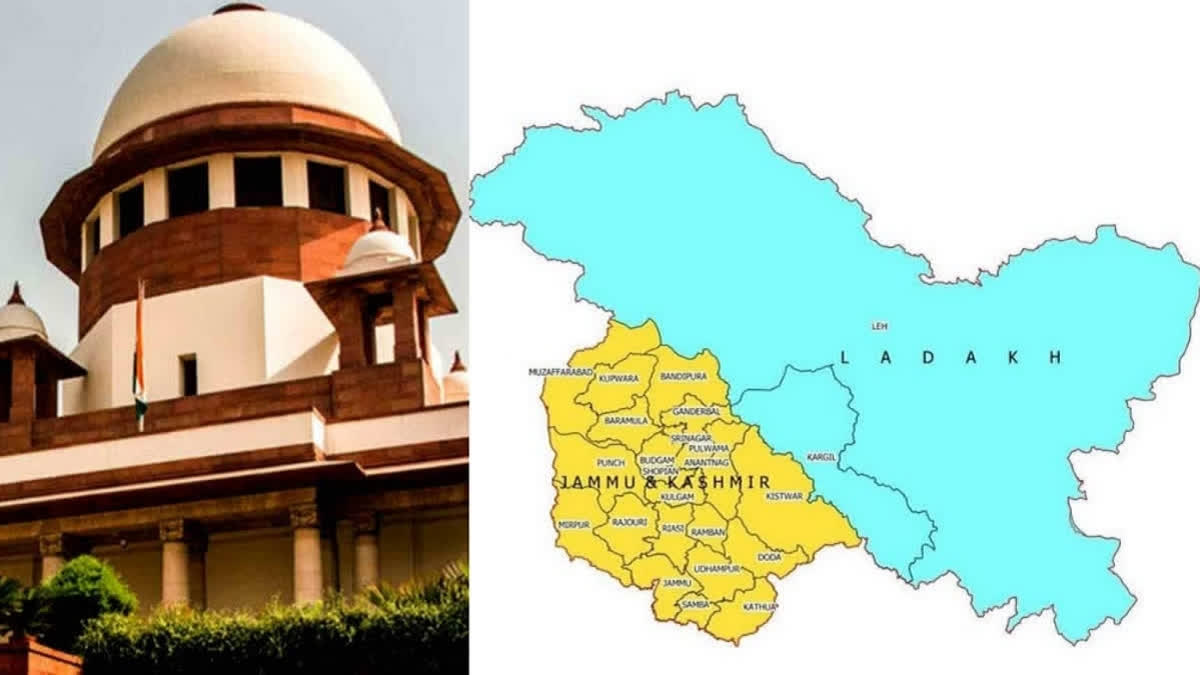New Delhi: The Supreme Court, in the ongoing hearing of petitions challenging abrogation of Article 370, Wednesday asked if the Jammu and Kashmir constituent assembly can bind the Parliament and can the constitution of a federal unit rise above the source of the federating unit.
The apex court observed that isn’t there intrinsic evidence that Article 370 itself is self-limiting once the constituent assembly has come to an end. It said that when other provisions could be modified, it was made clear that Article 1 could not be modified and this is a clear indicator of the fact that Article 370 was never intended to be permanent.
A five-judge bench headed by Chief Justice of India and comprising justices S K Kaul, Sanjiv Khanna, B R Gavai, and Surya Kant, is hearing a batch of petitions challenging the abrogation of Article 370, which bestowed special status on the erstwhile state of Jammu and Kashmir.
The Chief Justice addressing senior advocate Gopal Sankaranarayanan, representing one of the petitioners, said, "Can we not read Article 370 indicating at two terminal points? The first terminal point is in clause (2) of Art 370- namely formation of constituent assembly (CA) for framing the constitution and the second terminal is indicated in Article 370(3) which again refers to the recommendation of CA and interestingly, Article 370 is silent on once the constituent assembly is formed and has taken its decision, there is complete silence."
“If there is complete silence in Article 370, then 370, possible interpretation has worked itself out both in relation to clause (1) and relation to (2) and (3), in which case once that happens then we have two options... One, your line of thinking will be that the constitution of Jammu and Kashmir will fill in the void and that will be the supreme document”, the Chief Justice told Sankaranarayanan.
The Chief Justice pointed at the other scenario, can the constitution of a federal unit rise above the source of the federating unit and added that statesmen operated this country for 70 years and it is not what they did was unconstitutional, they did it to further the course of governance in the nation.
“But, if the terminal point of Article 370 is constituent assembly’s work, then is it not necessary that the work of constituent assembly of J&K has to be embodied in this Constitution to make it operational…”, said the Chief Justice.
Justice Chandrachud queried the counsel, “is this all exercise necessary, abrogation….abrogation postulates it continues…they applied Article 370 post 1957….but if Article 370 works itself out?” Sankaranarayanan said if 370 works itself out then it cannot be touched thereafter, as it has already worked itself out.
The Chief Justice replied it is there in the Constitution with self-limiting character, and “it is not obliterated but its text itself shows its self-limiting character, the whole operation of Article 370 has come to an end once the constituent assembly of the state was formed…..”.
The Chief Justice queried, is there not now “intrinsic evidence that Article 370 itself is self-limiting once the constituent assembly has come to an end….then do we say our Constitution must be read to treat the constitution of J&K as an overriding document?” The bench said though the J&K constitution framed its relation with the Union of India unless that relationship is embodied in the India Constitution how would it bind the dominion of India or Parliament?
The counsel contended that when the Indian Constitution recognizes the CA of one state and says it has the task of deciding whether to abrogate the clause or not then CA and its task is constitutionally recognized.
The Chief Justice said, “Does that mean anything said by CA of J&K will bind the nation, bind the Parliament or bind the executive, it had to be embodied subsequent to 1957 in a binding arrangement reflected in our Constitution, which was never done”. The bench said the idea was to gradually bring J&K into the mainstream.
The top court also noted that Article 1 is a permanent feature of the Constitution and said why did Art 370(1) contain a specific reference that Article 1 applies? It added that reason was that during that interim period when there was a power to modify provisions related to Instrument of Accession (IoA), Article 1 could also have been modified with concurrence.
The Chief Justice observed that during that period, when other provisions could be modified, it was made clear that Article 1 could not be modified and this is a clear indicator of the fact that 370 was never intended to be permanent.
The petitioners’ side today concluded their arguments and the Attorney General of India R Venkataramani, representing the Centre, will begin his arguments defending the Centre's decision to abrogate Article 370 on Thursday.



